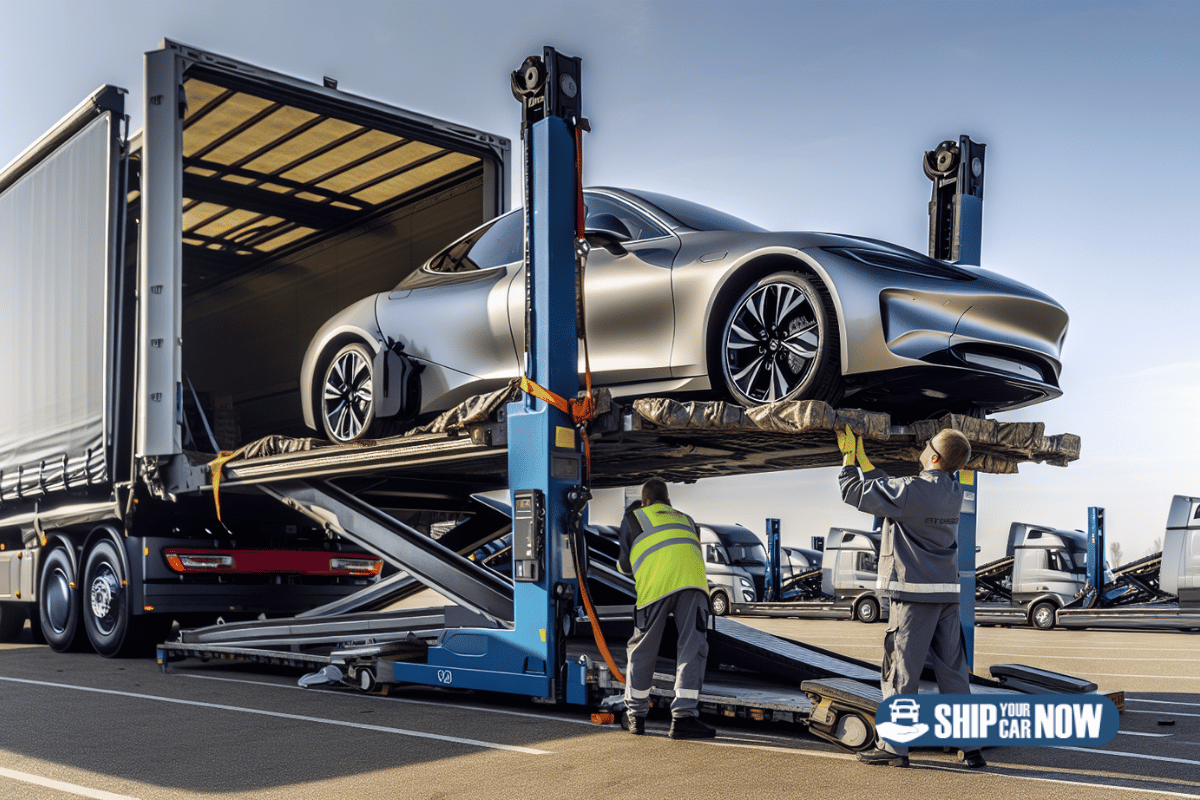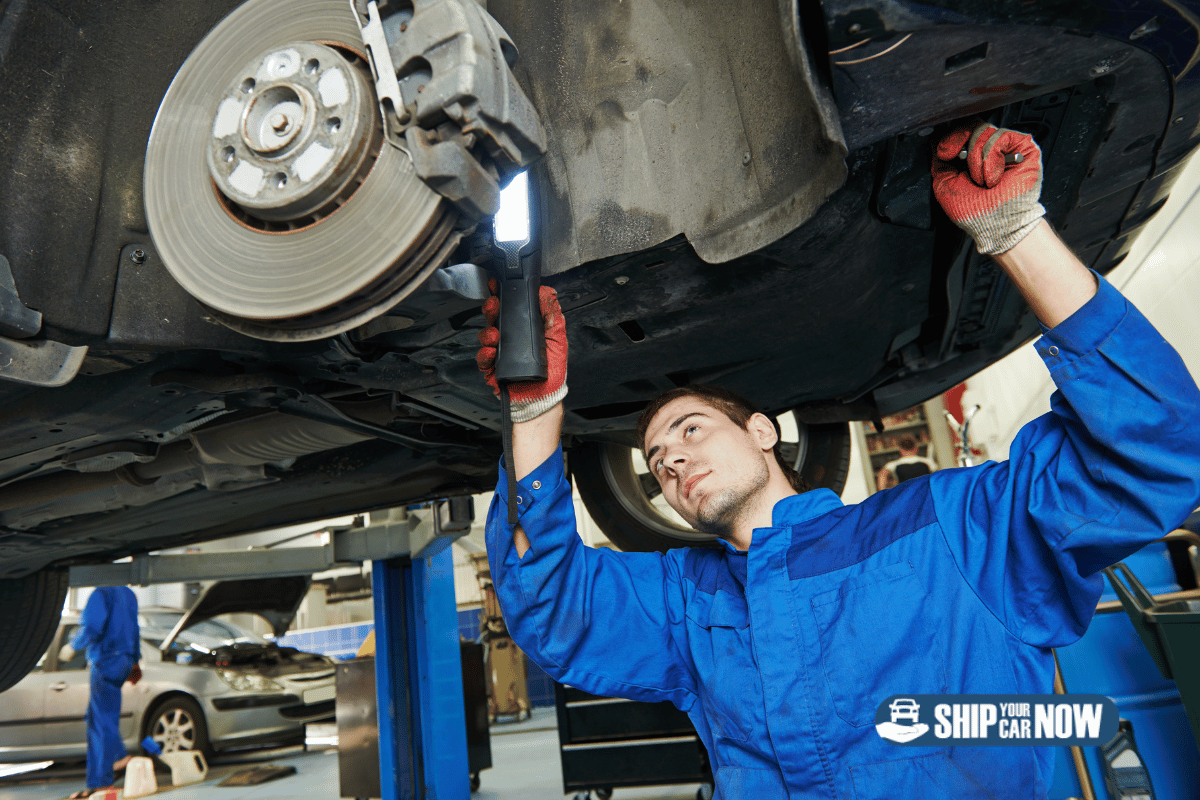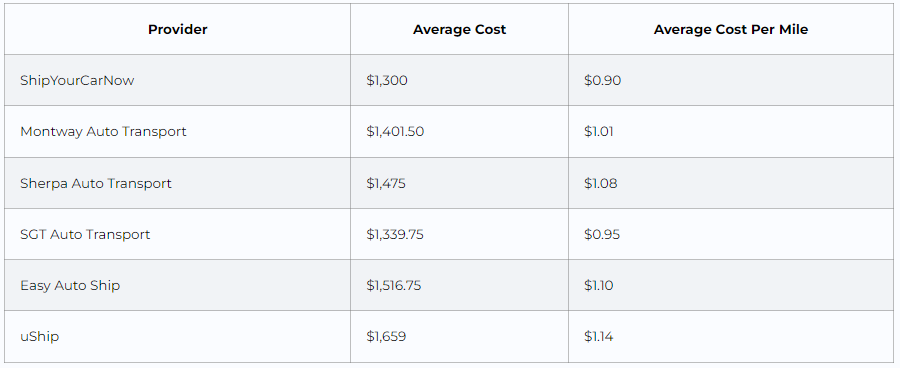Imagine this: you need to get your car across the country, from California to New York. You could drive it yourself, but think of the long hours on the road, the wear and tear on your vehicle, and the cost of food and accommodation along the way. Wouldn’t it be easier to have your car shipped?
Buckle up because you’re about to have a comprehensive understanding of cross country auto transport, including its benefits, how to choose a provider, and how to prepare your vehicle for transport.
Here Are The 8 Best Tips for Shipping a Car Cross Country:
- Choose The Right Company – Look beyond the lowest price and search for a cross country car transport company that is trusted and verified.
- Book Early – Securing your transport 2-3 weeks in advance with a reliable car shipping company ensures better rates and preferred pickup dates.
- Choose the Right Transport Type – Match your vehicle’s value and needs to the appropriate carrier (open vs enclosed).
- Prepare Your Vehicle Properly – Clean, document, remove valuables, and maintain 1/4 tank of gas for trouble-free shipping.
- Understand Insurance Coverage – Verify carrier insurance details, coverage limits, and consider supplemental coverage for valuable vehicles.
- Get Everything in Writing – Secure written documentation of all agreements, quotes, and condition reports before transport begins.
- Be Flexible with Timing – Provide 3-day windows for pickup and delivery to accommodate logistics and weather challenges.
- Complete a Thorough Inspection – Carefully examine your vehicle at delivery and document any issues before signing off.
Why Ship Instead of Drive?
Think about it – driving cross country means:
- Putting 2,500+ miles on your odometer
- Spending days behind the wheel
- Paying for hotels, food, and gas
- Risking accidents and wear on your vehicle
Cross country car shipping eliminates these concerns and protects your vehicle from unnecessary mileage.
1. Choose The Right Auto Transport Company

Look Beyond the Lowest Price
Many first-timers make the mistake of choosing an auto transport company based on price alone. This approach often leads to disappointment.
Quality cross country car shipping companies charge fair rates that reflect:
- Proper insurance coverage
- Experienced drivers
- Well-maintained equipment
- Responsive customer service
While saving money matters, the cheapest option rarely provides the best service or protection for your vehicle.
Verify Credentials First
Before considering any auto transport company, check these essential credentials:
- Valid USDOT number (searchable through FMCSA)
- Active insurance policy
- Proper licensing
- Years in business
You can verify USDOT numbers to confirm a company operates legally.
Compare Quotes Strategically
Request quotes from 3-5 reputable companies for your specific route. When reviewing quotes for shipping cars, ask:
- Is this door-to-door or terminal service?
- What insurance coverage is included?
- Are there any additional fees?
- What’s the estimated pickup and delivery window?
Most reputable cross country car shipping companies offer free, no-obligation quotes.
Research Customer Experiences
Check multiple review sources to gauge customer satisfaction:
- Google reviews
- Transport review sites
- Better Business Bureau ratings
- Social media feedback
Look for patterns in the reviews rather than focusing on isolated complaints.
You can find out more about the cross country car shipping company’s status by looking for a registered number on their website or consulting USDOT/MC numbers and also by checking the MC Docket Number at FMSCA’s portal.
2. Book Early

Last-minute bookings often cost more and limit your options. Car shipping companies work on schedules and routes, so early booking gives you:
- Better pricing options
- More carrier availability
- Preferred pickup dates
- Less stress and rush
For seasonal moves (summer or snowbird seasons), add an extra week to your planning timeline.
3. Choose the Right Transport Type for Your Vehicle
Match your vehicle’s needs to the appropriate transport method:
- Standard cars: Open transport works fine
- Luxury/classic vehicles: Consider enclosed shipping
- Modified or lowered vehicles: Specify clearance issues when booking
- Inoperable vehicles: Select a carrier with winch equipment
Your vehicle’s value and importance should guide this decision more than price alone.
After handling thousands of vehicle shipments for 17 years, I know what works. Let me break down your options.
Open Carriers
Most vehicles travel on open carriers for good reason:
- Lower cost (typically 30% cheaper than enclosed)
- Faster pickup due to greater availability
- Suitable protection for everyday vehicles
- Multi-car carriers maximize efficiency
Open car shipping works perfectly for most standard vehicles. The fact is cross country vehicle shipping should really be enclosed, if you want the highest guarantee of safety.
Enclosed Carriers
Premium protection comes with enclosed transport:
- Complete coverage from weather elements
- Protection from road debris and dust
- Less exposure to highway conditions
- Fewer vehicles per carrier
Collectors trust enclosed car shipping for their valuable classics and exotics. Cross country vehicle shipping companies usually recommend enclosed car transport for long distance car shipping. If you are shipping a car across the country, it’s the best way to maintain any sort of peace of mind.
Door-to-Door Service
Most customers prefer the convenience of:
- Direct pickup from your location
- Delivery to your specified address
- No extra driving to terminals
- Less handling of your vehicle
Door-to-door car shipping saves time and hassle and it’s the standard cross country car shipping method recommended in 2025.
Terminal-to-Terminal Service
Terminal service requires:
- Dropping off your vehicle at a facility
- Picking up at another terminal
- Working around terminal business hours
- Possibly paying storage fees
While looking cheaper upfront, hidden costs can add up with terminal cross country car shipping.
Which Option Fits Your Needs?
Consider these factors:
- Vehicle value (high-value = enclosed)
- Budget constraints
- Timeline flexibility
- Convenience requirements
Want personalized advice for your specific situation? Get approved with ShipYourCarNow and let our team of cross country car shipping experts guide you through selecting the perfect transport solution.
4. Prepare Your Vehicle Properly

Take these steps before the carrier arrives to ensure your car arrives in the expected condition:
- Clean your car (inside and out)
- Document existing damage with date-stamped photos
- Remove personal items and aftermarket accessories
- Leave only 1/4 tank of gas
- Disable alarms and toll transponders
- Check for and fix any fluid leaks
This preparation prevents disputes and ensures a smooth loading process.
Clean Your Vehicle Inside and Out
Start with a thorough wash. A clean car allows you to:
- Spot and document existing damage
- Make the inspection process faster
- Ensure accurate condition reporting
Don’t forget to clean the interior too – this helps you spot any items you might have forgotten.
Document Current Condition
This step proves crucial if disputes arise later:
- Take date-stamped photos from multiple angles
- Capture any existing scratches, dents, or damage
- Record odometer reading
- Don’t miss the roof and undercarriage
Preventing shipping damage starts with knowing the exact condition of your vehicle before transport.
Remove Personal Items
Most carriers prohibit personal items due to:
- Insurance limitations
- Weight restrictions
- Risk of damage or theft
- DOT regulations
Remove everything from your car, including:
- Electronics and chargers
- Toll transponders and parking passes
- Custom accessories and detachable parts
- Documents and vehicle registration (keep these with you)
Mechanical Preparations
Make sure your car runs properly for loading and unloading:
- Keep gas level at approximately 1/4 tank (reduces weight but provides enough fuel)
- Check for fluid leaks and fix if necessary
- Verify tire pressure meets manufacturer specifications
- Secure or remove loose parts
- Disable alarms that might trigger during transport
Create a Vehicle Condition Report
When the driver arrives, you’ll complete a condition report together:
- Note all existing damage
- Verify the report matches your documentation
- Keep a copy for your records
- Don’t rush this critical step
These steps are imperative both guaranteeing everything goes smoothly during shipment and protecting against anything unforeseen occurring throughout this process. If you’re considering cross country car shipping, we highly recommend this next step!
5. Understand Insurance Coverage
Never gamble with your vehicle’s protection during cross country car shipping. Many customers assume their cars carry full coverage during transit, but insurance details vary significantly between carriers.
Verify Insurance Documentation
Always request written proof of the carrier’s insurance policy before booking. This documentation should include:
- Insurance company name
- Policy number
- Coverage limits
- Expiration date
- Claims contact information
A quality auto transport company proudly supplies this information upon request.
Coverage Limitations Matter
Standard carrier insurance typically covers:
- External damage caused during transit
- Damage during loading/unloading
- Accidents or incidents while on the carrier
But often excludes:
- “Acts of God” (severe weather, natural disasters)
- Mechanical issues unrelated to transport
- Pre-existing damage
- Personal items left in the vehicle
- Certain vehicle modifications
Understanding auto transport insurance helps you avoid surprise gaps in coverage.
Know Your Deductible Exposure
Some carrier policies include deductibles ranging from $250-$2,000. Before shipping, confirm:
- Exact deductible amount
- Who pays this amount (you or the carrier)
- When payment would be required
- Documentation needed for claims
Lower deductibles often indicate higher quality insurance coverage.
Supplemental Coverage Options
For valuable vehicles, consider additional protection:
- Gap coverage for specialty/luxury cars
- Supplemental transit insurance
- Valuation coverage for classics
- Zero-deductible options
These typically cost 1-3% of your vehicle’s declared value but provide much greater peace of mind.
Cargo Insurance Requirements
Federal regulations require all legitimate carriers to maintain cargo insurance. The minimum levels vary, but look for:
- At least $250,000 in cargo coverage
- $1,000,000 in public liability coverage
- Active FMCSA registration
The best carriers provide at least $250,000 in cargo insurance coverage.
6. Get Everything in Writing

Verbal agreements aren’t enough for something as important as vehicle transport:
Verbal assurances don’t protect your vehicle during transport. After handling thousands of car shipments, I’ve seen how proper documentation prevents disputes and ensures clear expectations for everyone.
Detailed Written Quotes Protect You
Never accept verbal pricing. A proper cross country car shipping quote should specify:
- Total cost breakdown with all fees included
- Payment terms and methods accepted
- Car shipping services included (door-to-door service vs terminal)
- Type of transport (open/enclosed)
- Vehicle details (make, model, year, condition)
- Pickup and delivery locations
Compare car shipping quotes from multiple companies to spot hidden fees.
Bill of Lading: Your Most Important Document
This legally binding document serves as your shipping contract and includes:
- Detailed vehicle condition before transport
- Specific damage notation with photos
- Signatures from both you and the driver
- Transport company information
- Pickup confirmation
- Delivery acceptance
Always review this document thoroughly before signing.
Timeline Commitments
Get written confirmation of:
- Estimated pickup window (date range)
- Transit time expectations
- Estimated delivery window
- Communication protocols for delays
- After-hours delivery procedures
This prevents misunderstandings about when your vehicle will arrive.
Essential Contact Information
Collect and save:
- Dispatcher direct number
- Driver’s cell phone
- Company’s customer service line
- After-hours emergency contacts
- Claims department information
Store these contacts in your phone and on paper for backup.
Cancellation and Refund Terms
Know your rights by getting written details about:
- Deposit refund policies
- Cancellation deadlines
- Rescheduling options
- Weather delay protocols
- Late pickup/delivery compensation
Ready to work with a company that provides crystal-clear documentation? Get approved with ShipYourCarNow and experience transport with no surprises.
7. Be Flexible with Pickup and Delivery Times

Cross country car shipping works differently than package delivery. Flexibility around pickup and delivery dramatically improves your experience and often speeds up your transport.
Why 3-Day Windows Work Best
The most successful car shipments happen when customers provide:
- A 3-day pickup window rather than a single date
- A similar window for delivery expectations
- Morning and afternoon availability within those ranges
- Weekend flexibility when possible
Carriers build efficient routes based on multiple pickups, so rigid time demands can delay your transport or increase costs.
Designate Backup Representatives
Can’t be present yourself? Arrange trusted alternates who can:
- Inspect your vehicle with the driver
- Sign necessary paperwork
- Handle payment if needed
- Manage pickup or delivery logistics
- Be available during the window period
Proper pickup and delivery preparation includes having these backups ready.
External Factors Affect Timing
Even the best-planned transport faces variables beyond anyone’s control:
- Weather conditions (snow, ice, heavy rain)
- Traffic congestion in major cities
- Road construction and detours
- Mechanical issues with transport trucks
- DOT inspection points and weigh stations
These factors can shift delivery times by hours or occasionally days.
Stay Reachable During Transport
Keep communication channels open by:
- Answering unknown calls during your shipping window
- Checking text messages regularly
- Responding promptly to driver updates
- Having phone chargers readily available
- Setting up special ringtones for important contacts
Transport drivers often call 24-48 hours before arrival to confirm details.
8. Complete a Thorough Inspection at Delivery

When your vehicle arrives:
- Inspect it thoroughly in daylight if possible
- Check all exterior surfaces, including roof and undercarriage
- Test all functions (lights, windows, etc.)
- Note any issues on the bill of lading before signing
- Take delivery photos for your records
Address concerns immediately rather than waiting.
Why Smart Vehicle Owners Choose Cross-Country Car Shipping

Cross-country car shipping service is not only convenient but also safe and economical. Protection That Matters
Professional car shipping keeps your vehicle safe throughout its journey. Before your car ever touches a transport truck, carriers:
- Complete detailed inspection reports documenting current condition
- Photograph your vehicle from multiple angles as proof
- Cover vulnerable components during transit
- Secure vehicles with specialized strapping systems
This careful approach prevents damage during transport, giving you peace of mind.
Smart Economics
The numbers often surprise people – cross country car transport can actually cost less than driving yourself when you factor in:
- Gas for 2,500+ miles
- Hotel stays (2-4 nights depending on route)
- Meals on the road
- Time off work
- Wear on your vehicle (tires, oil changes, depreciation)
For many routes, the cost of shipping a car works out cheaper than the combined expenses of a road trip.
Save Your Valuable Time
Driving across country means spending 3-5 days on highways. Shipping lets you:
- Fly to your destination in hours
- Focus on other moving priorities
- Avoid driver fatigue and stress
- Maintain your normal schedule
Reduced Vehicle Wear
Every mile adds wear to your vehicle. A cross-country drive puts significant stress on:
- Engine components
- Transmission
- Tires
- Suspension
Professional auto transport eliminates this wear, helping maintain your car’s value.
Safety Protocols That Work
Transport companies maintain strict safety standards:
- Keeping fuel levels at 1/4 tank (reducing weight and fire risk)
- Removing personal items (preventing damage and theft)
- Following weight distribution guidelines
- Regular equipment inspections
Ready to ship your vehicle the smart way? Get approved with ShipYourCarNow and experience the convenience of professional car shipping.
Cross-country car shipping combines protection, affordability, and convenience in one package. When your vehicle needs to travel long distances, letting professionals handle the journey just makes sense.
The average cost to ship a car typically ranges from 40 cents to $1.96 per mile. Average costs for various distances (short, medium, long) are around $760, $1,472, and $1,972 respectively, usually for open transport of a functional vehicle.
Choosing the Right Auto Transport Company

The average cost to ship a car typically ranges from 40 cents to $1.96 per mile. Average costs for various distances (short, medium, long) are around $760, $1,472, and $1,972 respectively, usually for open transport of a functional vehicle.
Online Car Shopping Changed Everything
The classic car market went digital. Now buyers find dream cars across the country with a few clicks.
Back in 2008, most classic car buyers shopped locally. Today? They purchase vehicles sight unseen from anywhere, trusting photos and descriptions.
This created massive need for reliable cross country car transport nationwide.
Remote Work Revolution Shifted Moving Patterns
Work-from-anywhere policies transformed how people relocate. No longer tied to office locations, professionals move to their ideal cities while keeping their jobs.
This shift sparked:
- More cross-country moves than ever before
- Families buying cars in different states
- Need for hassle-free vehicle transport solutions
Vehicle shipping for relocations became essential rather than optional.
New Vehicle Types Need Specialized Transport
Electric vehicles and semi-autonomous cars require specialized handling during transport. Their unique components and systems need proper protection.
The rise of luxury EVs particularly drives demand for enclosed car shipping services that provide maximum protection.
Seasonal Migrations Drive Consistent Demand
Snowbird travelers heading south for winter or north for summer represent a huge segment of the car shipping market.
Rather than putting miles on their vehicles, these seasonal movers increasingly choose to ship their cars and fly to their destinations.
College Students Need Vehicle Transport
Parents sending kids to out-of-state universities face logistical challenges getting vehicles to campus.
Student car shipping services have grown into a specialized niche with timing aligned to academic calendars.
Frequently Asked Questions
How much does it cost to ship a car across the US?
Moving a car in the US is typically somewhere between $1,589 and more for expedited or enclosed delivery. Larger cars could incur additional costs with open car shipping services as the option of choice [3].
Is it better to ship or drive a car cross-country?
When taking a short trip, driving is the preferred choice. For long-distance moves, it would be prudent to entrust an established auto transport company with shipping your vehicle instead of handling the drive on their own, ensuring safety and reliability throughout.
How do you transport a car across the US?
Open auto transport services are a great way to cheaply ship your vehicle across the country due to their ability to accommodate up to 10 cars per trailer. This is why open cross country car transportation has become so popular. Your car will be loaded onto a multi-car open transport transporter and then safely delivered wherever you need it.
How much does it cost to ship a car from California to North Carolina?
On average, the cost of transporting a car from California to North Carolina is between $800-$900. It can be as low as $600 or may even exceed one thousand dollars depending on variables such as distance traveled, size, and type of vehicle shipped. Cross country vehicle shipping will save you on other costs like maintenance, time, and gas!
How do the size and weight of the vehicle affect the cost of shipping and shipping car cross country?
The cost of shipping is influenced by a vehicle’s dimensions and weight, as these necessitate larger spaces and more materials when being sent from one place to another.h companies, tracking progress along with other preparations necessary beforehand can guarantee hassle-free success when it comes to motorized delivery over vast regions vehicle cross country.








Senior automotive logistics professional with a passion for the industry and a 10+ year history of accomplishments. Proven track record of exemplary client management working with both RMCs, Van Lines and OEMs. Keen ability to react to an ever-changing marketplace while offering superior technology solutions, programs and services. Architect of award winning auto transport portal technology offering transparency and agility to clients, agents and transferees. Successful team builder and leader easily managing budgets with effective leadership, strategic planning, and problem-solving capabilities.